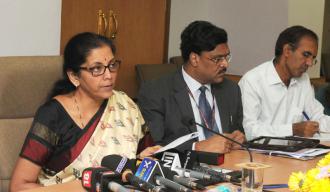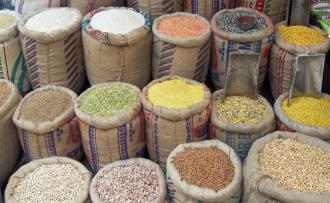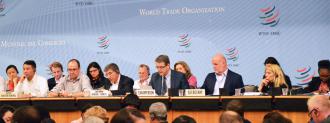
India agrees to support implementation of WTO Trade Facilitation Agreement
The Dollar Business Bureau | @TheDollarBiz Ms. Nirmala Sitharaman, Minister of State for Commerce & Industry (Independent Charge), announcing the breakthrough in WTO TFA talks in New Delhi on November 13, 2014 (Pic. source - Ministry of Commerce) After months of resistance, India has agreed to support the implementation of the World Trade Organisation’s Trade Facilitation Agreement (TFA). The TFA is considered the biggest breakthrough since the formation of the WTO and a major reform in multilateral trade. The TFA aims to reduce trade barriers, simplify trade procedures and reduce trade costs significantly. According to WTO estimates, the TFA has the potential to add over $1 trillion to the global economy. In the Bali conference last year, WTO members had agreed ...

India has support of 46 countries over food security concerns, WTO TFA: Rajeev Kher
The Dollar Business Bureau | @TheDollarBiz The Indian government has allocated around 58.8 million tonnes of foodgrains in FY2013-14 for Targeted Public Distribution System (TPDS)/ National Food Security Act (NFSA), and other welfare schemes. It is over 23% of India’s total annual foodgrains production of around 250 million tonnes. Rajeev Kher, India’s Commerce Secretary, has said that 46 countries in the G33 group have endorsed India’s stand that the World Trade Organisation (WTO) should first address food security concerns before finalising the Trade Facilitation Agreement (TFA). Speaking at an Interactive Session with the Heads of Regional Economic Communities (RECs) from Africa organised by the Confederation of Indian Industry (CII) in New Delhi, Rajeev Kher pointed out that India is not ...

Blocking TFA will hurt SMEs, multilateral trading system: WTO
The Dollar Business Bureau | @TheDollarBiz Roberto Azevêdo, Director-General, the World Trade Organisation (WTO), said in Mexico this week that small and medium-sized enterprises (SMEs) across the world stand to gain from a multilateral trading system and blocking the Trade Facilitation Agreement (TFA) will hurt the interests of small businesses. Roberto Azevêdo said, “By locking-in countries’ obligations on trade practices, the WTO safeguards important business interests and increases the stability businesses need to flourish.” He added that implementation of TFA would go a long way to help SMEs to tackle red tape and penetrate more foreign markets. TFA was considered as a major breakthrough since the inception of WTO. However, the agreement could not be ratified by the ...

India speaks out on objections to WTO Trade Facilitation Agreement
The Dollar Business Bureau | @TheDollarBiz The Indian government says that it did not support the ratification of Trade Facilitation Agreement (TFA) by the July 31, 2014 deadline due to the apprehension that concerns over food security would be brushed aside by developed countries if a permanent solution on food subsidies is not found first. India’s Minister of Commerce Nirmala Sitharaman told the Parliament today, “Seeing the resistance to taking forward the other Decisions [agreed at the Bali conference], the apprehension of developing countries was that once the process of bringing the Trade Facilitation Agreement into force was completed, other issues would be ignored, including the important issue of a permanent solution on subsidies on account of public stockholding for ...

WTO fails to bridge gap with India on Trade Facilitation Agreement
Bidhu Bhushan Palo | @TheDollarBiz This is not just another delay; this will have consequences, said WTO Director-General Roberto Azevêdo. Pic copyright: WTO The World Trade Organization (WTO) has failed to ratify the Trade Facilitation Agreement (TFA) that was finalized at the 9th WTO Ministerial Conference at Bali in December 2013 mainly due to India’s reluctance to allow consensus on TFA before negotiating a permanent solution on food subsidies. TFA was hailed as the first major agreement among WTO members since its inception in 1995. The legally binding agreement promises to reform global trade and aims to cut red tape; make trade easier, faster and cheaper; and simplify customs procedures among 160 WTO members. The agreement would also help landlocked countries ...


